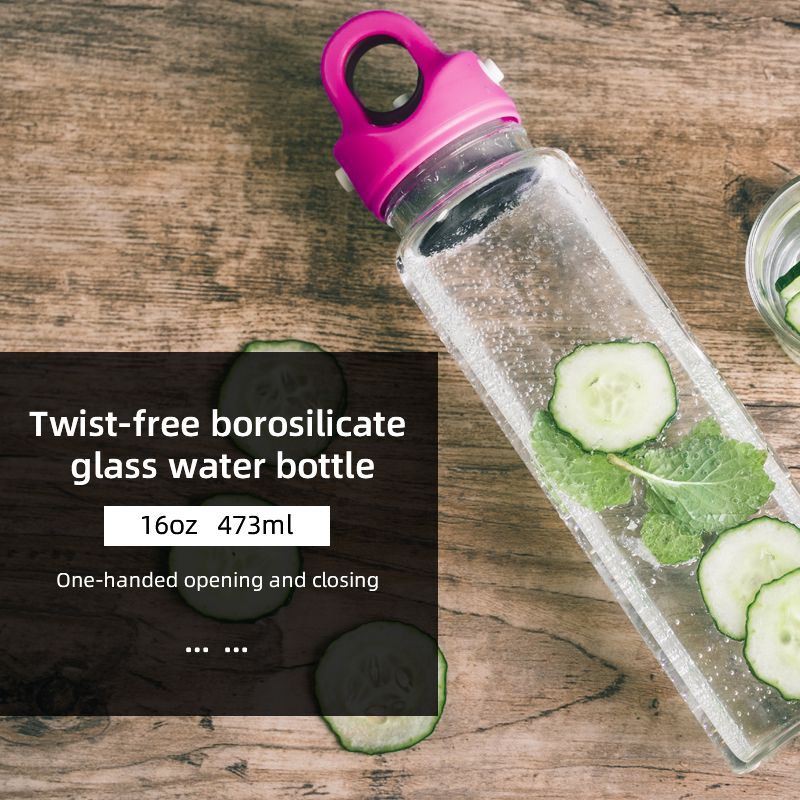Can I use a filter with my reusable glass water bottle?
As a supplier of reusable glass water bottles, I often get asked whether it's possible to use a filter with these bottles. The short answer is yes, you can use a filter with a reusable glass water bottle, but there are several aspects to consider.
Compatibility of Filters with Glass Water Bottles
First and foremost, the compatibility between the filter and the glass water bottle is crucial. Reusable glass water bottles come in various shapes, sizes, and designs. For instance, our Sealed Leak - proof Glass Water Bottle has a unique sealing mechanism, and the filter you choose needs to fit properly with its opening. Some filters are designed to be universal and can fit a wide range of bottle openings, while others are more specific to certain bottle models.
When selecting a filter, you need to check the diameter of the bottle's mouth. Our 16oz Leak Proof Glass Bpa Free Water Bottle has a standard - sized opening, which makes it easier to find a compatible filter. However, if you have a bottle with a non - standard or narrow opening, like our Twist - free Borosilicate Glass Water Bottle, you may need to look for a specialized filter that can adapt to such a design.
Types of Filters and Their Suitability
There are different types of filters available in the market, each with its own set of features and suitability for glass water bottles.
Activated Carbon Filters: These are one of the most common types of filters. Activated carbon works by adsorbing impurities such as chlorine, sediment, and some organic compounds from the water. They are relatively affordable and easy to use. When using an activated carbon filter with a glass water bottle, you simply need to insert the filter into the bottle's opening or attach it to a straw if the bottle has one. However, activated carbon filters may not be effective against all contaminants, such as heavy metals and some microorganisms.
Ceramic Filters: Ceramic filters are known for their ability to remove larger particles and some bacteria from the water. They have tiny pores that trap impurities as the water passes through. Ceramic filters are often more durable than activated carbon filters and can last for a longer time with proper maintenance. But they may be more expensive and require more complex installation in some cases. When using a ceramic filter with a glass water bottle, you need to ensure that the filter housing is properly attached to the bottle to prevent any leakage.
Reverse Osmosis Filters: Reverse osmosis is a more advanced filtration technology that can remove a wide range of contaminants, including heavy metals, salts, and microorganisms. However, reverse osmosis filters are usually large and require a complex setup, which may not be suitable for most reusable glass water bottles. They are more commonly used in home water filtration systems rather than portable bottle - based filters.
Benefits of Using a Filter with a Glass Water Bottle
Using a filter with your reusable glass water bottle offers several benefits.
Improved Water Quality: A filter can remove various impurities from the water, making it taste better and smell fresher. For example, if you are using tap water, a filter can remove the chlorine taste and odor, which is often present in municipal water supplies. This can encourage you to drink more water, which is essential for maintaining good health.
Health Protection: Filters can remove harmful contaminants such as bacteria, viruses, and heavy metals from the water. This is especially important if you are traveling to areas with poor water quality or if you are using water from natural sources like rivers or lakes. By using a filtered glass water bottle, you can reduce the risk of water - borne diseases.


Environmental Friendliness: Reusable glass water bottles are already an environmentally friendly alternative to single - use plastic bottles. When you add a filter to your glass water bottle, you can further reduce your environmental impact by avoiding the need to buy bottled water that has already been filtered. This helps to reduce plastic waste and conserve natural resources.
Maintenance of Filtered Glass Water Bottles
Proper maintenance is essential to ensure the effectiveness of both the filter and the glass water bottle.
Filter Replacement: Different filters have different lifespans. Activated carbon filters usually need to be replaced every few months, depending on the frequency of use and the quality of the water being filtered. Ceramic filters may need to be cleaned regularly and replaced after a certain number of uses. It's important to follow the manufacturer's instructions for filter replacement to ensure that the filter continues to work effectively.
Bottle Cleaning: Glass water bottles should be cleaned regularly to prevent the growth of bacteria and mold. You can use mild soap and warm water to clean the bottle, making sure to rinse it thoroughly. If you are using a filter, make sure to clean the area around the filter attachment as well.
Conclusion
In conclusion, using a filter with your reusable glass water bottle is not only possible but also beneficial. It can improve water quality, protect your health, and contribute to environmental sustainability. However, you need to carefully consider the compatibility of the filter with your bottle, choose the right type of filter for your needs, and maintain both the filter and the bottle properly.
If you are interested in purchasing our high - quality reusable glass water bottles and learning more about the suitable filters, we welcome you to contact us for procurement discussions. We are committed to providing you with the best products and solutions to meet your water - drinking needs.
References
- "Water Filtration Basics" by the Environmental Protection Agency.
- "The Science of Activated Carbon Filtration" in the Journal of Water Treatment.
- "Ceramic Filters: A Review of Their Performance and Applications" in the International Journal of Environmental Science and Technology.


